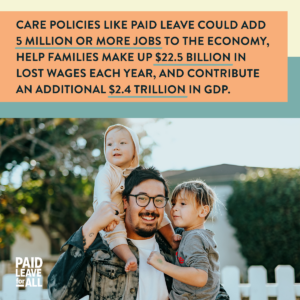
Passing a Faithful Recovery Package to Build Anew
Allison Baroni
August 4, 2021
 On July 13, 2021, the Senate announced that it had reached an agreement on a $3.5 trillion recovery package to be passed through the budget reconciliation process. This package, which is based on President Biden’s Build Back Better vision, together with the $1 trillion bipartisan Infrastructure Investment and Jobs Act, comes at a time when the COVID-19 pandemic has laid bare the gross inequity and lack of federal investment in our communities and infrastructure.
On July 13, 2021, the Senate announced that it had reached an agreement on a $3.5 trillion recovery package to be passed through the budget reconciliation process. This package, which is based on President Biden’s Build Back Better vision, together with the $1 trillion bipartisan Infrastructure Investment and Jobs Act, comes at a time when the COVID-19 pandemic has laid bare the gross inequity and lack of federal investment in our communities and infrastructure.
Congress has a responsibility to meet the moment, respond to the needs and demands of the people, and make a once in a generation investment in our public infrastructure. To do so, Congress must include the following priorities in a bold, faithful recovery package:
- Ensure any national paid family and medical leave program has progressive wage replacement, job guarantees and anti-retaliation language, inclusive definitions of family, and centers women of color in all decisions to ensure racially equitable access.
- Make the new Child Tax Credit and Earned Income Tax Credit expansions permanent and ensure all immigrants, regardless of legal status, can access the Child Tax Credit and human needs programs.
- Establish a pathway to citizenship for all undocumented immigrants including Dreamers, Temporary Protected Status (TPS) holders, and essential workers.
- Enact a set of federal standards for Unemployment Insurance (UI) including mandatory 26 weeks of benefits, adequate replacement wage levels (i.e. 75% of wages up to 2/3 of the state’s average wage), and ensure that unemployed workers’ access to benefits is racially equitable.
- Provide resources for multi-year rental assistance and address the ongoing unmet need for affordable housing by building affordable housing units.
- Make the broadband subsidy permanent to increase access to health care and other critical needs in communities across the country.
- Close the Medicaid coverage gap for non-expansion states and provide Medicaid to people who are incarcerated. Finance health expansions by allowing Medicare to negotiate drug prices.
As always, we will hear critiques that these priorities are too costly. Yet the human cost of not making these needed policy changes is far higher than $3.5 trillion could ever be. Far from a simple policy decision, the choice to include or reject these policy priorities has far-reaching consequences for the lived experiences of those in the United States. For every refusal to include these policy priorities, families in the U.S. face dire circumstances and decisions.
Behind all the political rhetoric, lies a simple and important question that we as a nation must answer: who are we beholden too? In Pope Francis’s most recent encyclical, Fratelli Tutti, he reminds us of the answer to that question. Reflecting on the story of Cain and Abel, he writes:
“Cain kills his brother Abel and then hears God ask: ‘Where is your brother Abel?’ (Genesis 4:9). His answer is one that we ourselves too often give: ‘Am I my brother’s keeper?’ (ibid). By the very question he asks, God leaves no room for an appeal to determinism or fatalism as a justification for our own indifference. Instead, he encourages us to create a different culture, in which we resolve our conflicts and care for one another.” (57)
We are at a tipping point. As our nation races toward devastating income inequality, inadequate access to health care, and a dearth of quality affordable housing and living-wage jobs, the breadth and depth of the policy response necessary can at times seem daunting. It can be all too easy for us to turn away from the task, to absolve ourselves of our responsibility to one another.
But, as Pope Francis says, if we are to build a culture of care, it must be done. Congress cannot afford to pretend that bold and immediate action is not necessary to improve and protect the lives of everyday people: the neighbor whose home is in danger of flooding, or the one who never had one to begin with. The parent struggling to pay childcare and the relative unable to access health care.
These everyday struggles are the result of policy choices. The question facing Congress can be reduced to this: Will we choose to be a nation that refuses to take care of its own, one that accepts poverty as inevitable? Or will we challenge that lie, asserting that no cost is too high to take care of each other? If we listen honestly to God’s question to Cain, we will find that there is only one answer!
Allison Baroni is a rising senior at Villanova University where she studies Peace and Justice & Theology. Allison is a member of the NETWORK Government Relations team this summer.







